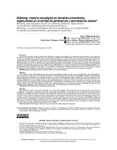
Please use this identifier to cite or link to this item:
http://ricaxcan.uaz.edu.mx/jspui/handle/20.500.11845/656| Title: | Mobbing: impacto psicológico en docentes universitarios, repercusiones en el sentido de pertenencia y permanencia laboral |
| Other Titles: | Mobbing: psychological impact on university professors, repercussions on the sense of belonging and working permanency Mobbing: o impacto psicológico sobre os acadêmicos, e as repercussões no sentido de pertencimento e permanência trabalhista |
| Authors: | Villagrán Rueda, Sonia Jasso Velázquez, David Aldaba Andrade, María Dolores Rodríguez Ortíz, Mónica |
| Issue Date: | Jan-2017 |
| Publisher: | Corporación Universitaria Americana |
| Abstract: | El presente artículo aborda el estudio del mobbing y su impacto psicológico en la dimensión de pertenencia y permanencia laboral. La investigación se aborda desde una perspectiva holística corroborándose que el sentido de pertenencia laboral se ve afectada de forma significativa, por las prácticas de mobbing que se generan en las Instituciones de Educación Superior. La fundamentación teórica permite evidenciar la necesidad de estudiarlo desde la psicología y analizarlo bajo la óptica de los modelos racionales, lo que lleva a hablar de la empresarilización de las universidades. Por otra parte, en cuanto a la metodología, se utilizó el método que se orienta a la comprensión de significados con base en la construcción de los datos; para lograrlo, se diseñaron instrumentos propios a partir de las técnicas cuantitativas y de origen cualitativo en una universidad pública con el personal docente (encuestas y entrevistas). Los resultados y conclusiones obtenidos, permitieron observar la presencia, aunque no significativa, del mobbing; su afectación psicológica y sus repercusiones en pertenencia y permanencia laboral. |
| Description: | This chapter works with mobbing concept and its psychological impact on the sense of belonging a job and keeping it. This research is carried out from a holistic perspective corroborating that the sense of belonging is affected by mobbing in Higher Education Institutions in a significant manner. The theoretical approach makes evident the need for studying it from a psychological point of view and to analyze it from the perspective of rational models, which leads to introduce the term “entrepreneurialization” of universities. It was used a methodology that it is based on data construction to achieve it, some own research-tools were designed, starting with quantitative and qualitative techniques (surveys and interviews) applied to teaching staff of a public university. The obtained results and conclusions allowed us to notice the presence, although not significant, of mobbing; its psychological effects and repercussions in the job belonging sense and job keeping. |
| URI: | http://hdl.handle.net/20.500.11845/656 https://doi.org/10.48779/74kw-eg16 |
| ISSN: | ISSN: 2027-2448 |
| Other Identifiers: | info:eu-repo/semantics/publishedVersion |
| Appears in Collections: | *Documentos Académicos*-- UA Psicología |
Files in This Item:
| File | Description | Size | Format | |
|---|---|---|---|---|
| PENSAMIENTO AMERICANO.pdf | 264,5 kB | Adobe PDF |  View/Open |
This item is licensed under a Creative Commons License
